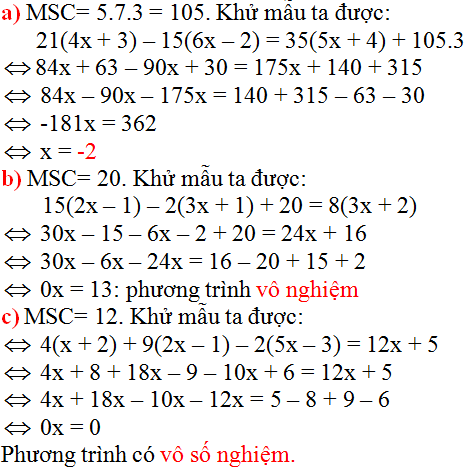Giai phương trình : \(\dfrac{x^2-12}{\left(x+2\right)^2}=3x^2-6x-3\)
Hãy nhập câu hỏi của bạn vào đây, nếu là tài khoản VIP, bạn sẽ được ưu tiên trả lời.


`a,` \(\dfrac{5x+2}{6}-\dfrac{8x-1}{3}=\dfrac{4x+2}{5}-5\)
`<=> (5(5x+2))/30 - (10(8x-1))/30 = (6(4x+2))/30 - (5.30)/30`
`<=> 5(5x+2) - 10(8x-1) =6(4x+2) - 5.30`
`<=> 25x + 10 - 80x + 10 = 24x+12 - 150`
`<=> -55x +20 = 24x-138`
`<=> -55x -24x=-138-20`
`<=>-79x=-158`
`<=> x=2`
Vậy pt có nghiệm `x=2`
`b,` \(\dfrac{x+2}{x-2}-\dfrac{1}{x}=\dfrac{2}{x\left(x-2\right)}\)
ĐKXĐ : \(\left\{{}\begin{matrix}x-2\ne0\\x\ne0\end{matrix}\right.\Leftrightarrow\left\{{}\begin{matrix}x\ne2\\x\ne0\end{matrix}\right.\)
Ta có : `(x+2)/(x-2) -1/x = 2/(x(x-2))`
`<=> (x(x+2))/(x(x-2)) - (x-2)/(x(x-2)) = 2/(x(x-2))`
`=> x^2 +2x - x +2 = 2`
`<=> x^2 + x =0`
`<=>x(x+1)=0`
\(\Leftrightarrow\left[{}\begin{matrix}x=0\\x+1=0\end{matrix}\right.\)
\(\Leftrightarrow\left[{}\begin{matrix}x=0\left(l\right)\\x=-1\end{matrix}\right.\)
Vậy pt có nghiệm `x=-1`
`c,2x^3 + 6x^2 =x^2 +3x`
`<=> 2x^3 + 6x^2 -x^2 -3x=0`
`<=> 2x^3 + 5x^2 -3x=0`
`->` Đề có sai ko ạ ?
`d,` \(\left|x-4\right|+3x=5\) `(1)`
Thường hợp `1` : `x-4 >= 0<=> x >=0` thì phương trình `(1)` thở thành :
`x-4 = 5-3x`
`<=> x+3x=5+4`
`<=> 4x=9`
`<=> x= 9/4 (t//m)`
Trường hợp `2` : `x-4< 0<=> x<0` thì phương trình `(1)` trở thành :
`-(x-4) =5-3x`
`<=> -x +4=5-3x`
`<=> -x+3x=5-4`
`<=> 2x =1`
`<=>x=1/2 ( kt//m)`
Vậy phương trình có nghiệm `x=9/4`

a: =>4(2x-1)-12x=3(x+3)+24
=>8x-4-12x=3x+9+24
=>-4x-4=3x+33
=>-7x=37
=>x=-37/7
b: =>(x-2)(x+2+x-9)=0
=>(2x-7)(x-2)=0
=>x=2 hoặc x=7/2
c: =>(x-1)(x+3)-x+3=3x+3
=>x^2+2x-3-x+3=3x+3
=>x^2+x-3x-3=0
=>x^2-2x-3=0
=>(x-3)(x+1)=0
=>x=-1

1: \(\Leftrightarrow6\left(3x-1\right)+3\left(6x-2\right)=4\left(1-3x\right)\)
=>18x-6+18x-6=4-12x
=>36x-12=4-12x
=>48x=16
hay x=1/3
2: \(\Leftrightarrow\left(2x-1\right)\left(2x-1+x-3\right)=0\)
=>(2x-1)(3x-4)=0
=>x=1/2 hoặc x=4/3

g.\(\dfrac{1-3x}{6}+x-1=\dfrac{x+2}{2}\)
\(\Leftrightarrow\dfrac{\left(1-3x\right)+6\left(x-1\right)}{6}=\dfrac{3\left(x+2\right)}{6}\)
\(\Leftrightarrow\left(1-3x\right)+6\left(x-1\right)=3\left(x+2\right)\)
\(\Leftrightarrow1-3x+6x-6=3x+6\)
\(\Leftrightarrow-5=6\left(vô.lí\right)\)
Vậy pt vô nghiệm
h.\(\dfrac{3\left(2x+1\right)}{4}-5-\dfrac{3x+2}{10}=\dfrac{2\left(3x-1\right)}{5}\)
\(\Leftrightarrow\dfrac{15\left(2x+1\right)-100-2\left(3x+2\right)}{20}=\dfrac{8\left(3x-1\right)}{20}\)
\(\Leftrightarrow15\left(2x+1\right)-100-2\left(3x+2\right)=8\left(3x-1\right)\)
\(\Leftrightarrow30x+15-100-6x-4=24x-8\)
\(\Leftrightarrow-89=-8\left(vô.lí\right)\)
Vậy pt vô nghiệm

Điều kiện \(\left\{{}\begin{matrix}\dfrac{4x-3x^2y-9xy^2}{x+3y}\ge0\\x+3y\ne0\end{matrix}\right.\)
Với \(3y\ge x\), hệ tương đương:
\(\left\{{}\begin{matrix}\left(x^4-2x^2+4\right)\left(x^2+2\right)=6x^5y\\\left(3y-x\right)^2=\dfrac{4x}{x+3y}-3xy\end{matrix}\right.\)
\(\Leftrightarrow\left\{{}\begin{matrix}x^6+8=6x^5y\left(1\right)\\x^3+27y^3=4x\end{matrix}\right.\left(I\right)\)
Vì \(x=0\) thì hệ vô nghiệm nên \(x\ne0\), khi đó:
\(\left(I\right)\Leftrightarrow\left\{{}\begin{matrix}1+\dfrac{8}{x^6}=\dfrac{6y}{x}\\1+\dfrac{27y^3}{x^3}=\dfrac{4}{x^2}\end{matrix}\right.\)
Đặt \(\dfrac{3y}{x}=a,\dfrac{2}{x^2}=b\) ta được hệ:
\(\Leftrightarrow\left\{{}\begin{matrix}1+a^3=2b\\1+b^3=2a\end{matrix}\right.\)
Giải hệ này ta được \(a=b\Leftrightarrow\dfrac{3y}{x}=\dfrac{2}{x^2}\Leftrightarrow y=\dfrac{2}{3x}\)
\(\left(1\right)\Leftrightarrow x^6-4x^4+8=0\)
\(\Leftrightarrow\left[{}\begin{matrix}x=\sqrt{2}\\x=-\sqrt{2}\\x=\sqrt{1+\sqrt{5}}\\x=-\sqrt{1+\sqrt{5}}\end{matrix}\right.\)
TH1: \(x=\sqrt{2}\Rightarrow y=\dfrac{\sqrt{2}}{3}\)
TH2: \(x=-\sqrt{2}\Rightarrow y=-\dfrac{\sqrt{2}}{3}\)
TH3: \(x=\sqrt{1+\sqrt{5}}\Rightarrow y=\dfrac{2}{3\sqrt{1+\sqrt{5}}}\)
TH4: \(x=-\sqrt{1+\sqrt{5}}\Rightarrow y=-\dfrac{2}{3\sqrt{1+\sqrt{5}}}\)
Đối chiếu với các điều kiện ta được \(\left(x;y\right)=\left(-\sqrt{1+\sqrt{5}};-\dfrac{2}{3\sqrt{1+\sqrt{5}}}\right)\)

2b. ĐKXĐ : \(x\ge-5\) (*)
Ta có \(\sqrt{x+5}=x^2-5\)
\(\Leftrightarrow4x^2-20-4\sqrt{x+5}=0\)
\(\Leftrightarrow4x^2+4x+1-4.\left(x+5\right)-4\sqrt{x+5}-1=0\)
\(\Leftrightarrow\left(2x+1\right)^2-\left(2\sqrt{x+5}+1\right)^2=0\)
\(\Leftrightarrow\left(x+1+\sqrt{x+5}\right)\left(x-\sqrt{x+5}\right)=0\)
\(\Leftrightarrow\left[{}\begin{matrix}x+1=-\sqrt{x+5}\left(1\right)\\x=\sqrt{x+5}\left(2\right)\end{matrix}\right.\)
Giải (1) có (1) \(\Leftrightarrow\left(x+1\right)^2=x+5\) ; ĐK: \(\left(x\le-1\right)\)
\(\Leftrightarrow x^2+x-4=0\Leftrightarrow x=\dfrac{-1\pm\sqrt{17}}{2}\)
Kết hợp (*) và ĐK được \(x=\dfrac{-1-\sqrt{17}}{2}\) là nghiệm phương trình gốc
Giải (2) có (2) <=> \(x^2-x-5=0\) ; ĐK : \(x\ge0\)
\(\Leftrightarrow x=\dfrac{1\pm\sqrt{21}}{2}\)
Kết hợp (*) và ĐK được \(x=\dfrac{1+\sqrt{21}}{2}\) là nghiệm phương trình gốc
Tập nghiệm \(S=\left\{\dfrac{-1-\sqrt{17}}{2};\dfrac{1+\sqrt{21}}{2}\right\}\)
2c. ĐKXĐ \(x\ge1\) (*)
Đặt \(\sqrt{x-1}=a;\sqrt[3]{2-x}=b\left(a\ge0\right)\) (1)
Ta có \(\sqrt{x-1}-\sqrt[3]{2-x}=5\Leftrightarrow a-b=5\)
Từ (1) có \(a^2+b^3=1\) (2)
Thế a = b + 5 vào (2) ta được
\(b^3+\left(b+5\right)^2=1\Leftrightarrow b^3+b^2+10b+24=0\)
\(\Leftrightarrow b^3+8+b^2+10b+16=0\)
\(\Leftrightarrow\left(b+2\right).\left(b^2-b+12\right)=0\)
\(\Leftrightarrow b=-2\) (Vì \(b^2-b+12=\left(b-\dfrac{1}{2}\right)^2+\dfrac{47}{4}>0\forall b\)
Với b = -2 \(\Leftrightarrow\sqrt[3]{2-x}=-2\Leftrightarrow x=10\) (tm)
Tập nghiệm \(S=\left\{10\right\}\)

b.
Với \(x=0\) không phải nghiệm
Với \(x\ne0\) hệ tương đương:
\(\left\{{}\begin{matrix}\dfrac{y}{x^2}+\dfrac{y^2}{x}=-6\\\dfrac{1}{x^3}+y^3=19\end{matrix}\right.\)
Đặt \(\left(\dfrac{1}{x};y\right)=\left(u;v\right)\) ta được: \(\left\{{}\begin{matrix}uv^2+u^2v=-6\\u^3+v^3=19\end{matrix}\right.\)
\(\Leftrightarrow\left\{{}\begin{matrix}3uv^2+3u^2v=-18\\u^3+v^3+19\end{matrix}\right.\)
Cộng vế với vế:
\(\left(u+v\right)^3=1\Rightarrow u+v=1\)
Thay vào \(u^2v+uv^2=-6\Rightarrow uv=-6\)
Theo Viet đảo, u và v là nghiệm của:
\(t^2-t-6=0\) \(\Rightarrow\left[{}\begin{matrix}t=-2\\t=3\end{matrix}\right.\) \(\Rightarrow\left(u;v\right)=\left(-2;3\right);\left(3;-2\right)\)
\(\Rightarrow\left(\dfrac{1}{x};y\right)=\left(-2;3\right);\left(3;-2\right)\)
\(\Rightarrow\left(x;y\right)=\left(-\dfrac{1}{2};3\right);\left(\dfrac{1}{3};-2\right)\)
a.
ĐKXĐ: \(x\ne3\)
- Với \(x\ge0\) pt trở thành:
\(\dfrac{x^2-x-12}{x-3}=2x\Rightarrow x^2-x-12=2x^2-6x\)
\(\Leftrightarrow x^2-5x+12=0\) (vô nghiệm)
- Với \(x< 0\) pt trở thành:
\(\dfrac{x^2+x-12}{x-3}=2x\Rightarrow\dfrac{\left(x-3\right)\left(x+4\right)}{x-3}=2x\)
\(\Rightarrow x+4=2x\Rightarrow x=4>0\) (ktm)
Vậy pt đã cho vô nghiệm

\(\left(x+3\right)\left(4-3x\right)+\left(x^2+6x+9\right)=0\)
\(\Leftrightarrow\left(x+3\right)\left(4-3x\right)+\left(x+3\right)^2=0\)
\(\Leftrightarrow\left(x+3\right)\left[\left(4-3x\right)+\left(x+3\right)\right]=0\)
\(\Leftrightarrow\left(x+3\right)\left(4-3x+x+3\right)=0\)
\(\Leftrightarrow\left(x+3\right)\left(7-2x\right)=0\)
\(\Leftrightarrow\left[\begin{array}{nghiempt}x+3=0\\7-2x=0\end{array}\right.\Leftrightarrow\left[\begin{array}{nghiempt}x=-3\\x=\frac{7}{2}\end{array}\right.\)
Vậy phương trình có tập nghiệm là \(\left\{-3;\frac{7}{2}\right\}\)
(x+3)(4-3x)+(x2+6x+9)=0
(x+3)(4-3x)+(x+3)2=0
(x+3)(4-3x)+(x+3)(x+3)=0
(x+3)(4-3x+x+3)=0
(x+3)(7-2x)=0
\(\Rightarrow\left[\begin{array}{nghiempt}x+3=0\\7-2x=0\end{array}\right.\)\(\Rightarrow\left[\begin{array}{nghiempt}x=-3\\2x=7\end{array}\right.\)\(\Rightarrow\left[\begin{array}{nghiempt}x=-3\\x=\frac{7}{2}\end{array}\right.\)
Vậy x=3;\(\frac{7}{2}\)
